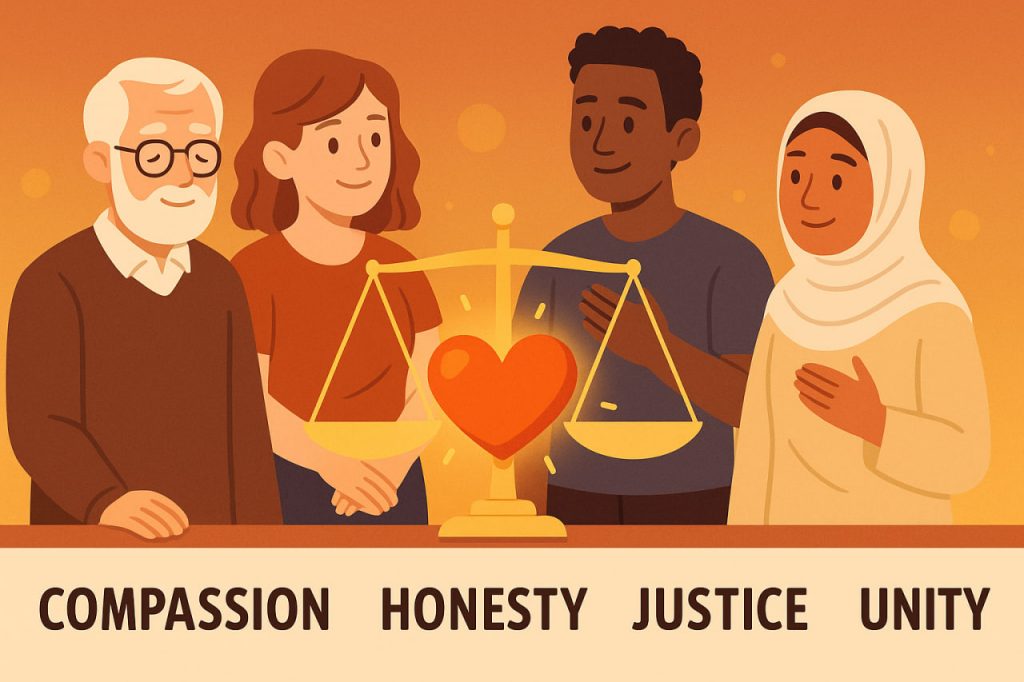Higher moral values are the guiding principles that define humanity’s sense of right and wrong, shaping how individuals and societies behave. They represent the highest ethical ideals — the foundation of compassion, justice, honesty, and respect that allow civilization to exist in harmony. These values are shared across cultures, religions, and philosophies, forming a universal code of conduct that transcends time and geography.
The Meaning of Higher Moral Values
At their core, higher moral values go beyond simple obedience to rules or fear of punishment. They are internalized principles, chosen freely by the individual as expressions of conscience and empathy. A person guided by these values acts rightly not because they must, but because they understand and feel it is the right thing to do.
Such values unite humanity by elevating behavior above instinct or selfish desire, promoting mutual respect, peace, and cooperation.
Examples of Higher Moral Values
- Compassion — the ability to feel another’s pain and act to relieve it. Compassion builds empathy, reduces conflict, and is at the heart of charity and kindness.
- Justice — the principle of fairness, ensuring that all individuals are treated with equality and dignity. Justice gives moral structure to society.
- Honesty — truthfulness in word and deed, forming the foundation of trust. Without honesty, communication and relationships collapse.
- Respect — recognizing the inherent worth of every living being. Respect keeps societies peaceful and inclusive.
- Responsibility — accepting the consequences of one’s actions. This value links freedom with accountability.
- Courage — the strength to uphold truth and virtue, even in the face of fear or opposition.
- Gratitude — awareness of the good in life and appreciation for others’ efforts, encouraging positivity and generosity.
The Roots of Moral Values in History and Philosophy
Ancient civilizations, from Egypt and Greece to India and China, built their laws and traditions on shared ethical ideals.
- In Plato’s philosophy, moral goodness was the harmony of the soul with the order of the universe.
- Confucius emphasized benevolence (ren) and righteousness (yi) as the foundation of moral society.
- Buddhism teaches compassion and mindfulness as paths to inner and collective peace.
- Christianity, Islam, and Judaism stress love, mercy, and justice as divine moral imperatives.
Despite cultural differences, nearly every moral code centers on kindness, fairness, and self-control — values that preserve human dignity and prevent chaos.
Higher Moral Values in Modern Society
In today’s world of technology, speed, and constant change, moral values are often tested. Globalization, political tension, and economic pressure can erode empathy and integrity. Yet, higher moral values remain essential for sustainable development and peace.
For example:
- Environmental responsibility reflects moral awareness toward future generations.
- Human rights advocacy stems from the belief in the equal worth of all people.
- Social justice movements are driven by moral courage and empathy for the oppressed.
Societies that uphold compassion and fairness prosper not just materially but spiritually, fostering trust, cooperation, and innovation.
How to Cultivate Higher Moral Values
- Self-reflection — regular introspection strengthens conscience and helps align actions with principles.
- Education — moral education should accompany academic knowledge, teaching empathy and ethics.
- Community service — volunteering nurtures compassion and responsibility.
- Dialogue and empathy — listening to others’ perspectives broadens moral understanding.
- Living by example — moral integrity inspires others more than words ever could.
Why They Matter for the Future
Human survival depends not only on science and technology but on moral intelligence — the ability to use knowledge wisely and ethically. As artificial intelligence, climate change, and inequality challenge our world, higher moral values will determine whether progress leads to unity or destruction.
Interesting Facts
- Psychologists have found that acts of kindness release oxytocin, the “bonding hormone,” improving both mental and physical health.
- Moral behavior triggers the same reward centers in the brain as music or art, suggesting ethics is naturally rewarding.
- Ancient philosophers often linked virtue with happiness, teaching that moral life leads to true fulfillment.
- The Universal Declaration of Human Rights (1948) is a modern codification of humanity’s shared moral ideals.
- Studies show children as young as two can recognize fairness and compassion — proving morality has biological roots.
Glossary
- Ethics — the philosophical study of moral principles and human conduct.
- Virtue — moral excellence developed through good habits and conscious effort.
- Empathy — the ability to understand and share another person’s feelings.
- Integrity — consistency between one’s beliefs, words, and actions.
- Moral intelligence — the capacity to apply ethics and compassion in decision-making.


